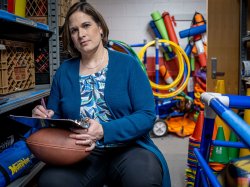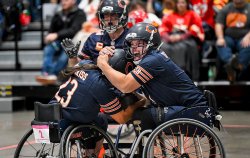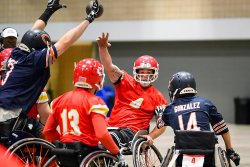Super Bowl LIX: Kinesiology Professor Teams Up with USA Wheelchair Football League for Veteran All-Star Game
Montclair State University’s Melissa Alexander helps ensure fair play and inclusivity on and off the field
Posted in: College for Community Health, University

Associate Kinesiology Professor Melissa Alexander is gearing up to support wheelchair athletes at the 2nd Annual Veteran All Star Game just before the Super Bowl matchup between the Kansas City Chiefs and the Philadelphia Eagles in New Orleans. As a volunteer, the Montclair State University professor will play a key role in player classification in the USA Wheelchair Football League (USAWFL) championship game during Super Bowl LIX pregame festivities.
Two teams, made up of military veterans from 14 teams across the country, will match up for the February 3 All Star Game hosted by Move United, in partnership with the National Football League (NFL) and Bob Woodruff Foundation. This is Alexander’s second year to work with the USAWFL, which was founded in 2020. She serves as a liaison between medical professionals and coaches to classify athletes for wheelchair football.
“This is something the athletes take great pride in,” Alexander says of the league. “I love watching. I was a very competitive figure skater, and I remember that sense of camaraderie and the joy you get. I love knowing that I’m helping develop that and helping to develop a sport.”

Championing Inclusion Through Adaptive Sports
Amy Aiello, interim dean for the College for Community Health expressed pride in Alexander’s contributions. “We’re incredibly proud of Melissa Alexander’s involvement with the USA Wheelchair Football League and in the Super Bowl pre-game festivities. Her presence at such a high-profile event not only represents our institution well, but also helps bring much-needed attention to adaptive sports.”
The All Star match will be played at the Ernest N. Morial Convention Center in New Orleans, as wheelchair football games are played indoors in arenas or courts or outdoors in paved lots.
What is Classification in Wheelchair Football?
Alexander’s journey into wheelchair football began when a graduate school classmate invited her to help set up an athlete classification system. With expertise in disability sports and physical education, she helped create a training program certifying coaches and team managers in athlete classification.
The classification system assigns athletes a number, from 1 to 5, based on their functional abilities, ensuring fair competition. Teams are capped at 21 total points on the field to ensure balanced competition. Alexander likened the system to weight classes in wrestling that ensures fairness. “Classifications aren’t unusual in sports,” Alexander says. “We have them in able-bodied sports, too. Essentially, it’s to ensure that someone wins the activity because of athletic ability and not because of another variable. Wheelchair football works much the same way, balancing higher-functioning players with those who have more significant disabilities.”
Volunteering for Impact
Alexander volunteers her time through the NFL-Bob Woodruff Foundation Salute to Service grant, which supports those who have served in the military and their families. Though it funds league operations and resources, such as equipment and travel, for the athletes, it does not compensate them for playing.
“I love knowing I’m being a part of that and helping develop something that, hopefully, like wheelchair basketball, is going to be longstanding and something that everybody knows about it. My other favorite part is being part of the change and making an impact.”

The Evolution of Wheelchair Football
While the National Wheelchair Basketball Association has been around since the late 1940s and women’s NWBA since the 1970s, wheelchair football is relatively new. It’s not uncommon for disability sports to result after wars or conflicts, says Alexander, noting that wheelchair basketball originated as rehabilitation efforts to get veterans to engage in physical activities again. Many veterans who were injured in the Afghanistan and Iraq wars participate in the USAWFL.
It was just a matter of time – and funding – for wheelchair football, which Alexander hopes will have the longevity of wheelchair basketball. “Football is seen as the All-American sport,” Alexander says, “it’s one of those activities that just has a different note in our culture.”
Even so, Alexander says she lacked football savvy. Her USAWFL colleagues occasionally tease her. “I’ll say something, and they’ll be like, that’s not a football term,” she says, laughing. “There’s a big learning curve, but I’m getting there.”
Since its founding, USAWFL has grown from five to 14 teams, with more than 1,000 players, and has trained more than 100 coaches. Alexander says wheelchair football falls between wheelchair rugby, an intense, high-contact sport, and wheelchair basketball, which has far less contact. While technically considered flag football, wheelchair football is a full-contact sport, she says. Wheelchair crashes may result in players falling onto pavement or a court, as well as injuries, she says, noting that helmets are the only required protective gear for athletes.
Teaching Future Physical Educators
After six knee surgeries and a final career-ending knee injury, Alexander made a dramatic U-turn from athletics to academia, where she has since focused on adaptive sports. Her specialty has been working with people with autism spectrum disorder, volunteering with Special Olympics.
Alexander brings her real-world experience in working with wheelchair football players to the classroom at Montclair State University, where she teaches two adaptive PE courses and prepares future physical educators to work with children with disabilities. She is also the graduate coordinator for the Master of Arts in Teaching program, which helps people with degrees in other fields become certified teachers, and oversees an adapted swim program on campus.
In addition to teaching Health and Physical Education students about utilizing physical education to increase different abilities or make it more accessible to everybody, Alexander shares some of the travel and logistical challenges posed for athletes with disabilities, including accessibility to hotel and other bathrooms, navigating flooded streets following a hurricane and tire blowouts due to hot temperatures.
“It’s been a good challenge,” she says. “I talk to the students about how there’s more going on than what we see in the classroom. My goal is to make sure our students are not just well prepared, but well rounded.”
Aiello says Alexander’s involvement with USAWFL aligns with CCHL’s values of inclusion and service: “This work shows her commitment to inclusive athletics and demonstrates to our students how sports can break down barriers and create opportunities for all athletes.”
Story by Staff Writer Sylvia A. Martinez.
Are you a…
Prospective
Student or Parent? Learn more about Kinesiology or other programs in the College for Community Health or plan a visit to our campus and take the first step in applying to become a Red Hawk.
Journalist?
Contact the Media Relations team for assets or to schedule an interview with a graduating student.
